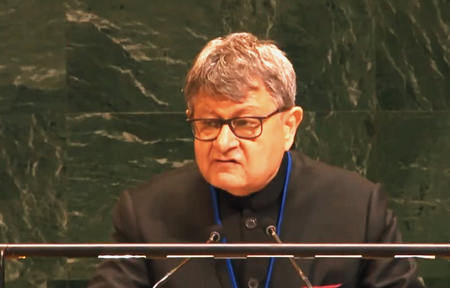

United Nations, July 31 (IANS) In a significant shift in India’s electoral politics, economic performance now matters more than “identity politics” in how voters judge leaders, according to Suman Bery, the vice president of NITI Aayog.
India “is now very much a developmental state” and “chief ministers across the board believe that they will be judged by inclusive growth,” he said in a recent interview here with IANS.
“One of the indications that performance is rewarded in the polls is (in how) several chief ministers — or the parties of several chief ministers — have been returned, suggesting that economic performance now matters much more than identity politics,” he said.
He said that it is apparent when the NITI Aayog Governing Council, comprising all chief ministers and lieutenant governors of union territories, meets for the annual meeting.
“These are people who are learning from each other and are competing with each other,” he said.
“NITI Aayog has massively increased its own support to states,” he said.
The organisation promotes Competitive Federalism, a concept to encourage states and even districts to compete in achieving Sustainable Development Goals across economic, health, educational, and social sectors.
Bery was here for the recent High-level Political Forum on Sustainable Development where he gave an account of India’s achievements in and strategy for achieving the UN’s Sustainable Development Goals.
Ministers and high-level development officials from several countries around the Global South met with Bery to learn about India’s development programmes that have elevated more than 171 million people out of poverty.
At the national level, Bery said, “The last decade has been characterised by Prime Minister (Narendra) Modi being our prime minister.”
“I’ve been privileged to see him up close for a bit more than three years, (and) there’s no question that he provides not only strong and consistent leadership, but is very focused on implementation,” he said.
To achieve the goal PM Modi has set for India to become a developed nation in time for the centenary of its Independence in 2047, he said, “The end is to become a modern society, (and) that’s easier if we have robust growth.”
“We have been doing well,” he said.
However, “we need to try and raise our growth rate,” he said, “because with an increase in growth also comes an improvement in inclusion.”
“The simplest way of thinking about how we should raise our growth rate … is to try and get more people working and to increase their productivity,” he said.
The demographic dividend of young people entering the workforce in India at a time when many countries stare at the prospect of a shrinking working population can boost India’s growth, he said.
“We have the so-called demographic dividend, which means that we have a bulge of new workers, and they can contribute to our increase in growth,” he said.
“We need to use this tailwind to try and grow faster, but that would also require a series of measures, not only to have more people work, largely women, but also to increase their productivity,” he said.
Asked about the need to transfer more people in the rural and farm sector to the urban and industrial sectors, Bery said, “It’s one of the ways in which you get an increase in productivity.”
However, he also questioned how much it mattered and said that with the right policies, agriculture can be a significant driver of India’s growth.
“Let’s be clear, there’s plenty of evidence that there is no longer surplus labour in agriculture, indeed, in the prosperous areas, workers are being imported from other parts of India,” he said.
“So, the notion that agriculture is like a ‘stagnant pond’ is not correct,” he said.
He cited the work of “a very learned agricultural economist,” NITI Aayog member Ramesh Chand, “who really does believe that agriculture, as much as manufacturing, will be an important part of India’s growth story with the right policies.”
(Arul Louis can be contacted at arul.l@ians.in)
–IANS
arul/sd/
